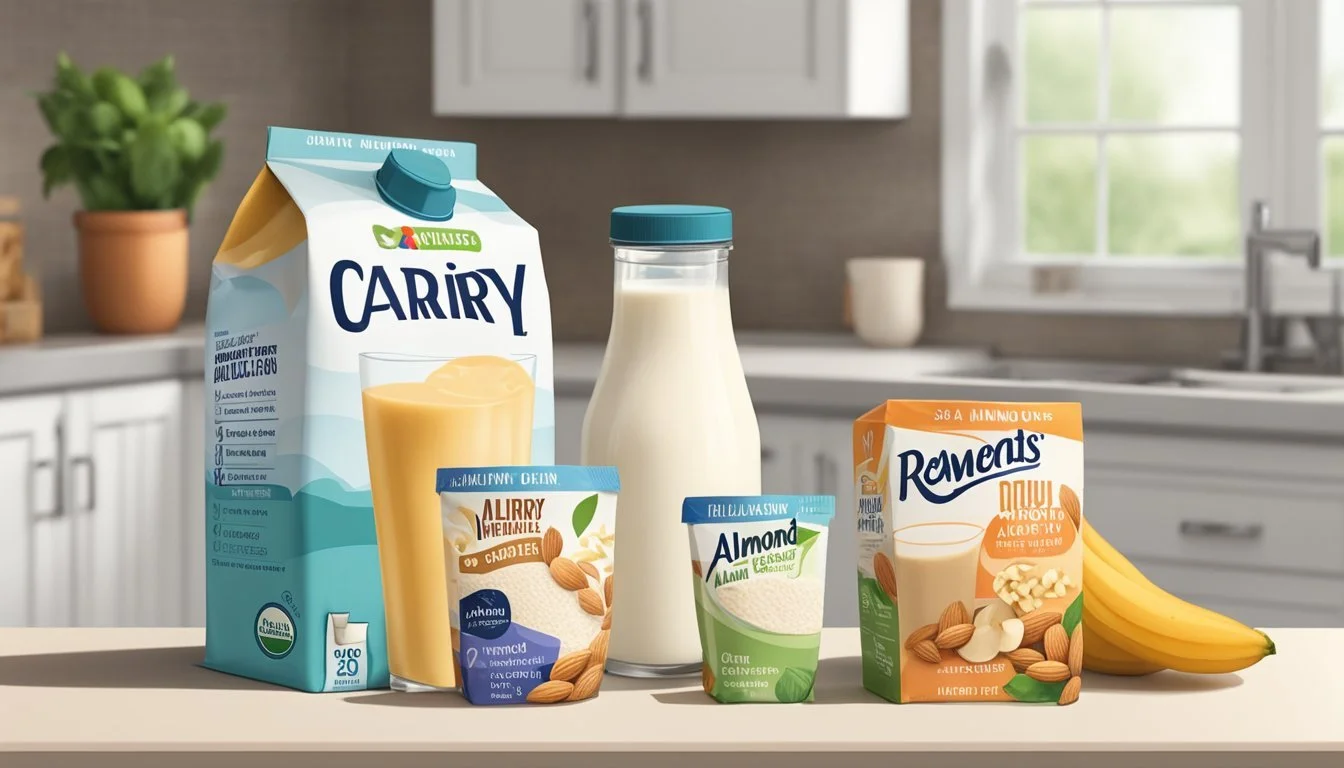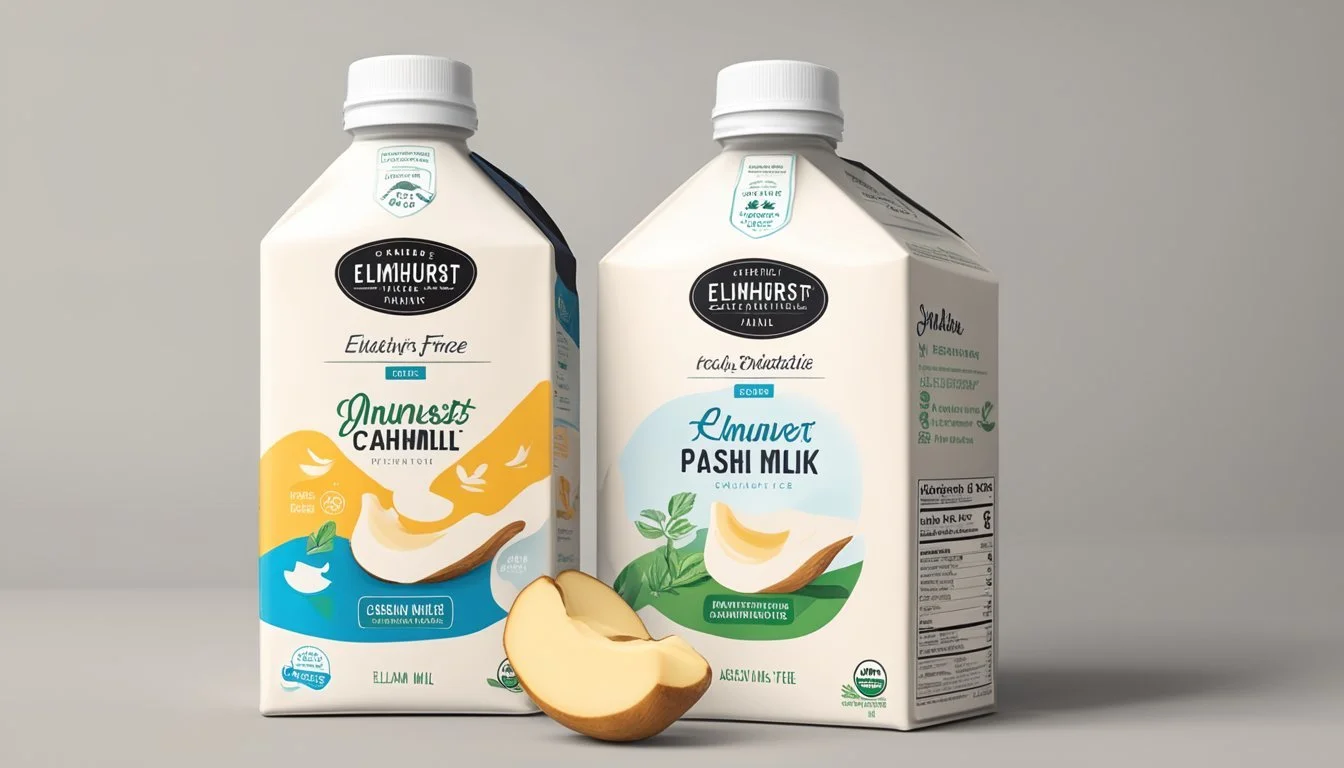3 Best Dairy-Free Milk Alternatives for Diabetics
Healthier Choices Explained
Diabetes management often includes careful consideration of dietary choices, including the types of milk consumed. Many people are turning to dairy-free milk alternatives for their nutritional benefits and suitability for specific dietary needs.
Choosing the right dairy-free milk alternative can play a crucial role in maintaining healthy blood sugar levels for diabetics. With various options available on the market, finding a milk alternative that aligns with individual health goals and preferences can be both practical and beneficial.
1) Almond Breeze Unsweetened Almond Milk
Almond Breeze Unsweetened Almond Milk is a popular choice for those looking for a dairy-free alternative. It is crafted from Blue Diamond almonds and is well-known for its quality and taste.
This almond milk stands out due to its low carbohydrate content, making it suitable for diabetics. Each serving contains just 1 gram of carbohydrate and 0 grams of sugar.
Another benefit is its high calcium content. A cup provides 450mg of calcium, which is 50% more than regular dairy milk. This helps meet daily calcium needs, which is important for bone health.
Moreover, it is free from artificial flavors and additives such as Carrageenan and MSG. This makes it a cleaner option for individuals conscious about what they consume.
For those who avoid gluten, Almond Breeze Unsweetened Almond Milk is a gluten-free option. This makes it accessible to people with gluten sensitivities or celiac disease.
Lastly, it has fewer calories compared to regular dairy milk. With only 30 calories per serving, it helps manage calorie intake effectively. This makes it an ideal choice for those looking to maintain or reduce their weight.
2) Elmhurst Unsweetened Cashew Milk
Elmhurst Unsweetened Cashew Milk is a versatile option for those looking to maintain stable blood sugar levels. It contains no added sugars, helping diabetics keep their carbohydrate intake in check. Each serving boasts a rich, creamy texture that complements a variety of dishes.
This plant-based milk is made with up to four times more nuts per serving compared to other brands. It provides a natural source of healthy fats and vitamins. With its simple ingredient list, it avoids unnecessary additives and preservatives.
It is also shelf-stable, meaning it doesn't require refrigeration until opened. Once open, it should be consumed within 7 to 10 days. This feature can be convenient for those who don’t use large quantities all at once.
Elmhurst's focus on high-quality ingredients and minimal processing makes it a reliable choice. It works well in coffee, cereal, and cooking. Diabetics can enjoy the flexibility it offers without compromising on taste.
3) Oatly Original Oat Milk
Oatly Original Oat Milk has gained popularity as a dairy-free milk alternative. Made from oats, this milk is particularly creamy and versatile. It can be used in various recipes and beverages, including coffee and smoothies.
Oatly Original Oat Milk contains beta-glucan, a type of soluble fiber that can help manage blood sugar levels. This makes it a suitable option for diabetics looking for healthy milk alternatives.
Additionally, it is fortified with essential nutrients like calcium and vitamins D and B12, supporting overall health. It is free from dairy, soy, and nuts, making it a good choice for those with multiple dietary restrictions.
With its smooth texture and rich flavor, Oatly Original Oat Milk is a pleasant addition to a diabetic-friendly diet.
Health Benefits of Dairy-Free Milk Alternatives
Dairy-free milk alternatives offer a range of health benefits, notably aiding blood sugar management and providing valuable nutrients without lactose. These benefits make them suitable choices for individuals with dietary restrictions or lactose intolerance.
Impact on Blood Sugar Levels
Dairy-free milks, such as almond and soy milk, generally have a low glycemic index. This means they are less likely to cause spikes in blood sugar levels. For diabetics, stable blood sugar is crucial, and these options can offer better control when compared to traditional cow’s milk.
Almond milk contains fewer carbohydrates than cow’s milk, which translates to lower blood sugar impact. Soy milk, often fortified, also presents a balanced profile with proteins and fats that help stabilize glucose levels after consumption.
Oat milk, though higher in carbohydrates, is rich in soluble fiber, particularly beta-glucan. This fiber slows down the absorption of sugar, helping to regulate blood sugar levels and improve insulin sensitivity.
Nutritional Content
Dairy-free milk alternatives are often fortified with vitamins and minerals. For instance, soy milk is commonly enhanced with calcium and vitamin D, making it nutritionally comparable to cow’s milk. This can help support bone health, which is particularly important for diabetics who are at higher risk for osteoporosis.
Almond milk is naturally rich in vitamin E, a powerful antioxidant that protects cells from damage. Cashew milk offers a creamy texture with lower calories and fat, beneficial for weight management.
Oat milk provides a good source of B vitamins and minerals like manganese and phosphorus. These nutrients support metabolic functions and overall health. It’s also a suitable option for those who prefer a nut-free alternative due to allergies.
By incorporating these dairy-free options, individuals can achieve a balanced diet, ensuring they receive essential nutrients while managing their blood sugar levels effectively.
How to Choose the Best Dairy-Free Milk Alternative
Selecting the best dairy-free milk involves examining nutritional labels and comparing ingredients. This ensures the choice meets dietary needs and preferences.
Reading Nutritional Labels
When choosing a dairy-free milk alternative, it's essential to examine nutritional labels. Key factors include carbohydrate content, sugar levels, and calorie count. Diabetics should look for low glycemic options to avoid spikes in blood sugar.
Protein content is another consideration, as higher protein can help manage hunger and energy levels. Soy milk and hemp milk often contain more protein compared to options like almond milk.
Furthermore, check for fortified vitamins and minerals such as calcium, vitamin D, and B12, particularly if you are avoiding dairy-rich products.
Comparing Ingredients
Another crucial aspect is the ingredient list. Ideally, choose products with minimal ingredients to avoid heavily processed options. Simple, whole food ingredients ensure better health benefits and fewer digestive issues.
Avoid added sugars, artificial flavors, and preservatives. Unsweetened versions are typically better choices for diabetics. Additionally, be cautious of potential allergens. Nut-based milks like almond and cashew can be problematic for those with nut allergies.
Different base ingredients also offer unique benefits. Oat milk can be beneficial for heart health due to its fiber content, whereas coconut milk provides healthy fats.
Using tables or lists to compare various options based on ingredients and nutritional values aids in making an informed decision. This structured approach ensures each dairy-free milk fits individual health goals efficiently.
Incorporating Dairy-Free Milk Alternatives into Your Diet
Dairy-free milk alternatives can be seamlessly integrated into various meals and beverages to cater to specific dietary needs, especially for diabetics. Adjusting recipes and beverage choices ensures nutrition and flavor are maintained.
Breakfast Recipes
Oatmeal: Oat milk or almond milk can be used to prepare a creamy, satisfying bowl of oatmeal. For extra protein, consider adding chia seeds or nuts.
Pancakes: Substitute traditional cow's milk with unsweetened almond milk or soy milk to create diabetic-friendly pancakes. Ensure the recipe includes whole-grain flour and minimal sugar.
Smoothie Bowls: Utilize coconut milk or macadamia nut milk as the base for smoothie bowls. Top with low-sugar fruits such as berries and a spoon of nut butter for protein.
Cereals: Replace regular milk with any preferred dairy-free options. Soy milk provides more protein, while almond and oat milks offer creamy texture with fewer carbs.
Smoothies and Beverages
Green Smoothies: Combine spinach, cucumber, avocado, and unsweetened almond milk for a nutritious, low-carb smoothie. This helps maintain stable blood sugar levels.
Protein Shakes: For post-workout recovery, blend soy milk, which is high in protein, with a scoop of protein powder and a handful of berries.
Lattes: Create a rich, creamy latte by using oat milk, known for its texture and ability to froth well. Add a dash of cinnamon for a touch of natural sweetness without added sugar.
Hot Cocoa: Use unsweetened coconut milk for preparing hot cocoa. Sweeten with a natural, low-calorie sweetener like stevia to keep blood glucose levels in check.
Incorporating these dairy-free milk alternatives into daily meals and drinks can provide nutritional benefits and promote better blood sugar management.




